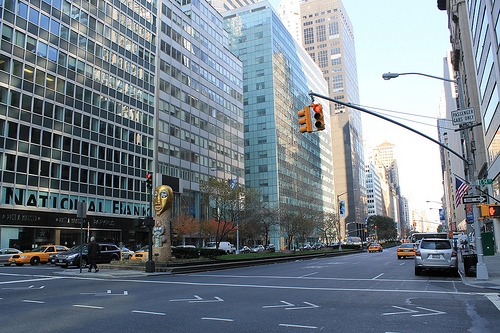Chicago, Boston, Denver, and Washington, DC—all have something the nation’s largest city doesn’t: residential parking permits (RPPs). New Yorkers instead take their chances finding spaces on the street, trading their time circling blocks for free public parking, yet they’d swap those circumstances for a permit, even if meant paying for it.

Park Avenue, by Patrick Nouhailler.
That’s the surprising finding researchers from NYU and the City University of New York (CUNY) discovered after surveying 200 respondents in the Bronx, Brooklyn, Queens, and north Manhattan areas between 2010 and 2011. In fact, the average amount survey-takers said they would pay for a yearly permit was $215, more than twice the most expensive parking permits in the country. (That honor is held by San Francisco, where drivers pay $109 annually for parking permits.)
That figure falls somewhere between what other studies with different methodologies have produced. In Belmont, for example, residents of the Bay area suburb said that they would be willing to pay $40 per year for a residential parking permit, while residents of urban Amsterdam said they were open to paying almost $4,000 yearly for the same type of permit.
The New York survey also revealed that car-less respondents weren’t any more or less likely to support permit fees than were car owners. Those who had used public transit at least six times in the seven days before taking the survey were more inclined to support fees, however, as were those who spent more than the average times looking for parking and walking home from where they had parked. (According to the survey, respondents spend an average of nine minutes sharking for on-street parking and almost four minutes walking home from those spots.) What’s more, they’re willing to pay higher-than-average prices for such permits.
Not surprisingly, respondents with higher incomes also backed permits at higher-than-average rates, but not the retired or respondents with children, who, despite being more likely to support RPPs, generally said they would pay less for them than those who are employed or childless.
The survey results suggest that an at-cost RPP program wouldn’t mean political hari-kari for city leaders, who would have to seek action from City Hall and the New York state congress to implement anything definite. Policymakers have sought to move forward with such a program in the past, however, with RPPs included in Mayor Bloomberg’s failed congestion pricing plan in 2008 and addressed by the city council as a separate possibility in 2011. Since then, DOT studies have rejected the idea of RPP programs in areas near stadia in the Bronx and Brooklyn.
But NYU professor Zhan Guo, who coauthored the study with Simon McDonnell, a policy analyst at CUNY, said that how a RPP program is designed “can largely define the success or the failure of the program,” with factors such as the boundaries of the program area and number of permits sold being key.